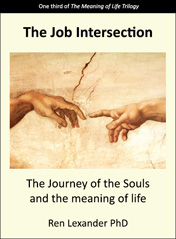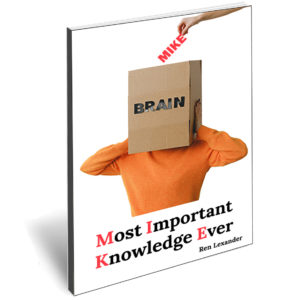FORTHCOMING
Book Three of The Meaning of Life Trilogy

This book traces the human journey from the origin of all things.
Only by understanding the origin of humanity can we ultimately understand whether there was a purpose and meaning behind the human journey – and so learn how every one of us can make each of our lives truly meaningful.
If you are ready for it, this is one of the most important books you will ever read.
Testimonials
 “A major part of my personal journey has been invested in finding ways to heal a broken spirit. At some level, that I could never fully comprehend, I was acutely aware that complete healing could not take place within conventional psychology, or any other modality that focuses solely on healing emotional wounds accumulated throughout one’s personal history. It certainly didn’t work for me.
“A major part of my personal journey has been invested in finding ways to heal a broken spirit. At some level, that I could never fully comprehend, I was acutely aware that complete healing could not take place within conventional psychology, or any other modality that focuses solely on healing emotional wounds accumulated throughout one’s personal history. It certainly didn’t work for me.
Reading “The Job Intersection” enlightened me. It gave meaning to my questions, and it gave me answers. I recognised that as a spiritual entity I had power, far more power than I had ever anticipated or was ever willing to claim. Even more astonishingly, I/We have more power than God. Now that is not a frivolous claim that I am just throwing out there, as ” The Job Intersection” will attest. It was quite humbling to recognise this as a truth. But what to do with that power?…
It was late in the evening when I finished reading the book. As I often do I went for a walk and sat on a park bench under the stars. On this occasion I contemplated what I had just read. Jesus has been quoted as saying, ”Forgive them father for they know not what they do”. I have often told people during a coaching session, “You would not ridicule a blind man for accidentally hitting you with his walking stick, so how can you condemn someone for their actions when they don’t know any better?” I considered mistakes I had made raising my daughter. Though it was never my intention I know there were times when she got hurt, and I felt the pain of hurting her. “Does she hold resentment toward me for that?”
As “The Job Intersection” explains; Godhead had good intentions when it spawned souls and was subsequently shocked at the result. It occurred to me that God didn’t know what he was doing and perhaps, like me with my daughter, was feeling the pain. That insight opened up a space in me for forgiveness. As I sat on the bench dwelling on that revelation I imagined God before me. I felt his pain, and I simply said, “God, I forgive you”. In that moment an enormous burden was lifted from me and I felt healed. I felt whole. I felt complete. From that day to this “I live in peace”.
I had wanted all my life to heal a wounded soul. “The Job Intersection” helped me find away.
To Ren, I am forever indebted.”
– Karl Knight
“Mr. Lexander has processed the BEGINNING in brand new (to me) terms, and done so creatively that delivers a message that explains the WHY of the human condition today. He can make your brain hurt.”
– Harry Sigworth
Extract
Prologue: The Job Intersection
Job was a successful businessman. Really successful. On every possible level.
He was a hard-working family man who never did the wrong thing by anybody. He was respected by all. Loved by his wife and children. Fair in all his dealings. And devout in his Israelite faith.
His hard work and honorable life had paid off: a mansion, all the creature comforts, servants, good health, great family, the esteem of the rest of the community.
Even God respected him, singling him out to his angels: ‘…my servant Job… there is none like him in the earth, a perfect and an upright man, one that feareth God, and escheweth evil’.
But a favored angel of God – an angel whom the Bible calls ‘Satan’ – disputed with God. He told God that Job was only true, upright and revered God because God had been good to him: ‘Thou has blessed the work of his hands, and his possessions have increased in the land. But put forth thy hand now, and touch all that he has, and he will curse thee to thy face.’
How does God reply to Satan?
Does he say, ‘Job’s a good bloke. He’s always done the right thing. He deserves all the good things he’s got.’?
No he doesn’t.
Does he say: ‘I’m omniscient. I don’t need to interfere with Job’s life. I know he’s loyal to me.’?
No. Instead, he delivers Job up to Satan as a plaything: ‘Behold, all that he has is in your power; only upon himself do not put forth your hand.’
In one single day, Job’s servants are slaughtered, his livestock stolen or consumed by unearthly fire and all his children killed.
Does Job curse God?
No.
‘Naked I came from my mother’s womb, and naked shall I return; the Lord gave, and the Lord has taken away; blessed be the name of the Lord.’
You think this would be more than enough for all concerned but, no, Satan goes back to the Lord God and says, ‘But put forth thy hand now, and touch his bone and his flesh, and he will curse thee to thy face.’
Does God do the compassionate thing and say, ‘Leave the poor man alone. He’s suffered enough’?
No. Instead, he again gives him over to Satan, ‘Behold, he is in your power; only spare his life.’
(This is the same Old Testament God who, when handing out the Ten Commandments, described himself as ‘showing steadfast love to thousands of those who love me and keep my commandments’.)
Job is then subject to ‘loathsome sores from the sole of his foot to the crown of his head’.
Job’s wife has had all she can endure and screams at her husband. ‘Do you still hold fast your integrity? Curse God and die.’
But still Job forbears. ‘Shall we receive good at the hand of God, and shall we not receive evil?’
Does merciful God look down on Job and say, ‘Enough!’ and heal him of his sores and restore to him his fortune?
No.
He lets him keep suffering… and suffering… and suffering… and suffering…
Only after days and nights of this terrible, wearing torment does Job open his mouth. ‘Let the day perish wherein I was born.’
His friends, who have come around to visit him, end up giving him no comfort or compassion. Basically, their simple-minded line is: It happened to you, therefore you must deserve it. God is, by definition, just. ‘Behold, God will not reject a blameless man, nor take the hand of evildoers.’
In fact, marked out by God, Job has suffered because he did NOT deserve it. This dreadful suffering has been inflicted on him because he was good and blameless.
God and Satan were testing out man.
Job knows full well that he does not deserve such miseries. He opens his mouth and from his mouth pour some of the most profound observations ever made on the relationship between God and man.
‘But how can a man be just before God? If one wished to contend with him, one could not answer him once in a thousand times… Though I am innocent, I cannot answer him… If I summon him and he answered me, I would not believe that he was listening to my voice… If it is a contest of strength, behold him! If it is a matter of justice, who can summon him! …though I am blameless, he would prove me perverse… therefore I say, he destroys both the blameless and the wicked. When disaster brings sudden death, he mocks at the calamity of the innocent. The earth is given into the hand of the wicked; he covers the faces of its judges – if not he, who then is it? …he is not a man, as I am, that I might answer him, that we should come to trial together. There is no umpire between us, who might lay his hand upon us both.’
And Job even turns his voice to God himself: ‘Does it seem good to thee to oppress, to despise the work of thy hands and favour the designs of the wicked? Hast though eyes of flesh? Dost thou see as man sees?’
Here is the kernel of the problem: God has not eyes of flesh. He does not see as man sees. He does not feel as man feels. God is incapable of moral sensibility or empathy or sympathy because he does not understand the lot of Man.
Job’s friends are horrified by Job passing judgment on God. They lecture him: ‘If you set your heart aright… you will be secure, and will not fear. You will forget your misery; you will remember it as waters that have passed away.’
Job replies: ‘… you whitewash with lies… Will you speak falsely for God, and speak deceitfully for him? Will you show partiality toward him, will you plead the case for God? …Behold, he will slay me; I have not hope; yet I will defend my ways to his face.’
Consider how momentous these words are.
Man, in the person of Job, has developed a sense of justice and morality so strong that he feels even God should come under its standards.
Absolutely extraordinary.
Job felt the pain that every soul carries deep within it: the abandonment by God and the injustice of that. ‘God has cast me into the mire, and I have become like dust and ashes. I cry to thee and thou dost not answer.’
But eventually God does answer.
He comes to Job in the form of a whirlwind and, from that whirlwind, he speaks to Job.
Does God claim to be just, to be moral, and that Job deserved his fate?
No. None of that.
Instead, he boasts about how powerful he is. ‘Where were you when I laid the foundation of the earth? …Can you bind the chains of the Plei’ades, or loose the cords of Orion? …Shall a faultfinder contend with the Almighty?’
In the face of God’s awesome power, Job does the smart thing: he says nothing. ‘Behold, I am of small account; what shall I answer thee? I lay my hand on my mouth. I have spoken once, and I will not answer; twice, but I will proceed no further.’
But the Lord thunders back from the whirlwind. ‘Gird up your loins like a man; I will question you, and you declare to me. Will you even put me in the wrong? Will you condemn me that you may be justified? Have you an arm like God, and can you thunder with a voice like this?’
And then there is more stuff on how all-powerful he is.
Job is too astute to further anger the all-mighty.
Yet Job’s argument was correct: Job had been morally upright and yet injustices had been rained down upon his head. Indeed, he was afflicted so badly because he had been upright and pious.
This may be an ancient Israelite story but it is a saga that modern man can relate to. The world reeks of injustice. The ruthless prosper; the righteous struggle. Arms dealers are rich; teachers are poor. Drug lords thrive; nurses are underpaid. CEO’s crash companies and wreak economic mayhem and yet walk away with millions of dollars.
Sometimes one gets the feeling that, like Job, the good are punished because they are good. Being good, they won’t resort to violence, deception, theft, backstabbing, lies, broken promises. Because the ruthless sense this about the good, they do grievous things to them – things that they would not dare do to other ruthless people through fear of retribution.
Like Job, the good are seemingly punished because they are good. Like Job, we are left with an overwhelming sense of the injustice of life – and thereby of the injustice of any Creator.
Job personifies a human moral indignation which can turn to God and, whatever the terrible consequence, can say: YOU ARE UNJUST.
And, in the end, God grudgingly acknowledges the rightness of Job’s position.
!
God speaks angrily to the ‘friends’ of Job who have been defending God as just!
‘My wrath is kindled against you… for you have not spoken of me what is right, as my servant Job has… and my servant Job shall pray for you, for I will accept his prayer not to deal with you according to your folly; for you have not spoken of me what is right, as my servant Job has.’
God has admitted that Job spoke the truth about him and the men who had defended God’s character have to make sacrifices to appease a displeased God!
Meanwhile, Job who savagely criticized God has his fortunes restored. ‘…the LORD gave Job twice as much as he had before.’
In the end, despite God’s filibustering about how all-powerful he is, Job has won God’s respect.
What a staggering work The Book of Job is. Regard it as truth or fiction, legend or myth, it is one of the most formidable creations in human literature for it tells the story of a lowly creature in an ape body who had evolved into something that was beyond God’s ability to comprehend him… a creature with a moral code and ethical sensibility that God could not truly understand and yet was forced to yield the floor to.
This is the Job Intersection.
This is the point where the Journey of the Souls and the Journey of God collided and God yielded ground. The point where God realized that Job was right: God could not see with eyes of flesh. God could not understand Man. [1]
Amidst all the chronic misinterpretations of the Bible, I have never come across any part of the Bible with such an obvious in-your-face interpretation and yet so consistently blanked out and so conscientiously misinterpreted by professed Christians.
I had a conversation with a devout Christian woman who went to church and Bible study classes every single week. I started to talk about The Book of Job and how, in the end, Job had lost patience with God and turned on him in judgment.
‘That never happened,’ she declared.
‘It’s in the Bible.’ I even quoted her passages from The Book of Job as best as I could from memory.
‘No, it never happened.’
‘But it’s in the Bible.’
‘No! It never happened.’
!
A life-long devout Christian dear friend of mine read an early draft of this book and avowed: ‘There must be another interpretation of it. I don’t know what it is but there must be one.’
!!
But I do understand why faith-based Christians blank out The Book of Job so willfully. It is because it absolutely calls for a fundamental re-conceptualization of the nature of God. Look at what it calls into question:
- God is good. Not in The Book of Job he’s not. He willfully allows the torture of an innocent.
- It is Man’s role to learn from God. In The Book of Job, God learns from man.
- God is all-knowing. Why did he need to allow the torture of Job if he already knew?
- God is perfect and is unchanging. In The Book of Job, God changes. He changes his mind. He concedes ground to Job: admitting Job was right and that God is not perfect.
- God understands Man. The Book of Job suggests that God does not truly understand Man – because he cannot see with ‘eyes of flesh’.
This is the Job Intersection. This is the collision of two great journeys: the Journey of the Souls and the Journey of God. This collision forced a shocking realization on God: that he had not eyes of flesh, that he could not see as Man did, that he did not understand the lot of Man.
Out of the Job Intersection, God formed a great ambition… surely the most amazing ambition in the history of time: that he would see as Man saw – that he would experience the quintessential experience necessary to understand the lot of Man: unjustified suffering. For it is only in the experience of unjustified suffering that you can come to truly understand the journey of Man: pain, bravery, fortitude, despair, morality, courage, honour, depression, injustice…
But before we come to the journeys of John the Baptist and Jesus, we first need to address a great conundrum: How did the souls and God arrive at the Job Intersection?
How did it get to the point where the Creator would be confounded by his creations?
To answer this question, we have to go back to the origin of all things… back before there were souls… back before there was even a God…
Table of Contents
The Job Intersection.
Part I: The Journey to the Job Intersection
- The Journey to God.
- The Journey of the Souls
- The Secret Life of Souls.
- The Journey of God.
Part II: The Journey from the Job Intersection
5. The Journey of Jesus.
6. Contemplations on the Journey of Jesus.
Part III: Implications of the Journey of the Souls and the Journey of God
7. Exploding the God delusions.
8. The Psychology of Souls.
Part IV: The Meaning of Life
Part V: The journey of inner evolution
Part VI: The Meaning of Your Life
My Confession
Bibliography.
Postscript.








